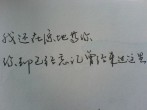
民俗英语中考作文【一】
世界上还有几个节日要吃香喷喷的粽子呢?
世界上还有几个节日是要洒雄黄酒的呢?
世界上还有几个节日是要在门前挂草药,身上涂药酒的呢?
没错,的确,只有端午节,一个伟大的节日,一个神圣的节日。要说起来这端午节,还得从战国时期著名诗人屈原说起。
相传在战国时期,楚国上大夫屈原上谏楚王,提出富国之计,可楚王不仅不听,还将其流放。结果屈原悲愤交加,伤心欲绝,抱一块石头,带着自己的愤愤不平,带着他的高远志向,一起永沉泪罗江底。
屈原后,人们为纪念他,为了使他的尸首不被鱼虾吞食,人们便做了粽子,来喂鱼虾。流传至今,便有了吃粽子的习惯。这天,满街都有一股粽叶的清香。要说这做粽子,先得把粽叶洗净,用粽叶把肉、糯米、豌豆包一起煮,从锅里散发出的诱人香味,不禁让人口水“直流三千尺”盼着,想着早点煮熟。终于,冒着热气的.粽子上来了,一家人围坐在桌子那儿一起吃,其乐融融。夹起一块糯米,放入口中。啊!香甜可口,甜而不腻。让我忍不住想把整个粽子吞下去。虽然家附近几乎天天都有粽子卖,但今天的粽子仿佛有股节日特有的,浓浓的气息。
吃完粽子,大人们便忙着去洒雄黄酒,据说可以驱鬼辟邪,以保平安。端午这天,满街都有一股酒味,有些大人还会用雄黄酒在孩子的额头上写个大大的“王”字,象征生龙活虎、虎虎生威。
洒完雄黄酒,大人们便在两边大门上挂菖蒲等中草药,菖蒲那股刺鼻的味道可以驱赶鬼魔,使邪魔不敢靠近你家。挂完后,还要在孩子身上涂药酒,可保以年不生疮。涂药酒也可使你百病不入,一生平安。
转眼间,这年的端午就要过完了,但是,端午给我留下的痕迹是永远也抹不掉的,又开始期待来年的端午了。
民俗英语中考作文【二】
I was born in a beautiful town with high mountains around it.The mountains are covered with all kinds of green bamboo.Through the town runs a small stream.It’s said that a new railway is going to be built to the east of the town and a bamboo factory to the west.All the children of the school age can go to school.If anyone is ill,he can go to see the doctor in the newly-built hospital.People in the town are hard-working and never take the backwardness lying down.Though they are having a richer and better life,they are not satisfied with what they have got.They are working hard to build their town into a modern one.
民俗英语中考作文【三】
导入:
第1段:Recently we’ve had a discussion about whether we should... (导入话题
Our opinions are divided on this topic.(观点有分歧
正文:
第2段:Most of the students are in favour of it.(正方观点
Here are the reasons. First... Second... Finally...(列出2~3个赞成的理由
第3段:However, the others are strongly against it. (反方观点
Their reasons are as follows. In the first place... What’s more... In addition...(列出2~3个反对的理由
结论:
第4段:Personally speaking, the advantages overweigh the disadvantages, for it will do us more harm than good, so I support it.(个人观点 オ
民俗英语中考作文【四】
导入:
第1段:提出一种现象或某种困难作为议论的话题
正文:
第2段:Many ways can help to solve this serious problem, but the following may be most effective. First of all... Another way to solve the problem is ... Finally...(列出2~3个解决此类问题的办法
结论:
第3段:These are not the best but the only two/ three measures we can take. But it should be noted that we should take action to...(强调解决此类问题的根本方法
民俗英语中考作文【五】
导入:
第1段:Some people hold the opinion that A is superior to B in many ways. Others, however, argue that B is much better. Personally, I would prefer A because I think A has more advantages.
正文:
第2段:There are many reasons why I prefer A. The main reason is that ... Another reason is that...(赞同A的原因
第3段: Of course, B also has advantages to some extent... (列出1~2个B的优势
结论:
第4段: But if all these factors are considered, A is much better than B. From what has been discussed above, we may finally draw the conclusion that ...(得出结论 オ
民俗英语中考作文【六】
端午节有许多的习俗,如吃棕子、赛龙舟等。在我妈妈的故乡——三明就有一种“插茱萸”的习俗。
茱萸是一种草,它细细长长的,又是绿油油的。每到端午节,当地的老人们就会在自家的每一个门的两旁都插上一秼茱萸,以求神灵保佑平安。
有一次端午节,我们一家人回到了三明。那天,我第一次看到外公、外婆插茱萸。只见外公搬来一节长梯,在门的旁边(门框前架好,然后小心翼翼地拿出一秼茱萸草,拜了拜天,口里念念有词,然后慢慢地爬上梯子。最后,外公仔细找这门边的裂缝,等到找到了裂缝之后,再把那一秼茱萸草插上去,然后下来。
我们和外公在远处得意洋洋望着大大小小的门上被我们用心插上的茱萸。微风徐徐吹过,门旁的茱萸在微风中轻轻摇摆着身体,好像笑这对我们说“放心吧!我一定回保佑大家平安的!”
这就是我的家乡的端午节习俗之一—插茱萸。但是,随这时代的进步,越来越少人会要想要插茱了。
所以,我向大家提议:大家要保持这种习俗把古老又悠久的习俗一代又一代地传下去。
民俗英语中考作文【七】
1。 头绪分明,脉络清楚
写好记叙文,首先要头绪分明,脉络清楚,明确文章要求写什么。要对所写的事件或人物进行分析,弄清事件发生、发展一直到结束的整个过程,然后再收集选取素材。这些素材都应该跟上述五个“ W ”和一个“ H ”有关。尽管不是每篇记叙文里都必须包括这些“ W ”和“ H ”,但动笔之前,围绕五个“ W ”和“ H ”进行构思是必不可少的。
2。 突出中心,详略得当
在文章的框架确定后,对支持故事的素材的选取是很关键的。选材要注意取舍,应该从表现文章主题的需要出发,分清主次,定好详略。要突出重点,详写细述那些能表现文章主题的重要情节,略写粗述那么非关键的次要情节。面面俱到反而使情节罗列化,使人不得要领。这一点是写好记叙文要解决的一个基本问题,也需要一定的技巧。如:
One night a man came to our house and told me, "There is a family with eight children。 They have not eaten for days。" I took some food with me and went。
When I finally came to that family, I saw the faces of those little children disfigured (破坏外貌) by hunger。 There was no sorrow or sadness in their faces, just the deep pain of hunger。
I gave the rice to the mother。 She divided the rice in two, and went out, carrying half the rice。 When she came back, I asked her, "Where did you go?" she gave me this simple answer, "To my neighbors — they are hungry also!"
3。 用活语言,准确生动
记叙文要用具体的事件和生动的语言对人、事、物加以叙述。一篇好的记叙文的语言既要准确、生动,又要表现力强,这样才能把人、事描写得具体生动,其可读性才强。试比较下面一篇例文修改的前后效果。
原文:
One day Xiaoqiang was wandering away。 He was soon lost among people and traffic。 He could not find the way back home and started crying。 Just then, two young students who were passing by found him standing alone in front of a shop and crying。 They went up to Xiaoqiang and asked him what had happened。 Xiaoqiang told them how he got lost and where he lived。 The two students decided to take him home。 Mother was pleased to see Xiaoqiang come back safe and sound。 She invited the two students into the house and gave them some money, but they didn't take it。 She served them with tea but they left。
修改后:
The other day, five-year-old Xiaoqiang left home alone and wandered happily in the street。 After some time, he felt hungry so he wanted to go back home。 But he found he was lost among the crowded people and heavy traffic。 When he could not find the way home, he started and crying。 Just then, two young students who were passing by from school found him sanding crying in front of a shop。 They immediately went up to him。
"Little boy, why are you standing here crying?" they asked。
"I want Mom, I go home。" said the boy, still crying。
"Don't worry, we'll send you home。"
And they spent the next two hours looking for the boy's house。 With the help of a policeman, they finally found it。
When the worried mother saw her son come back safe and sound, she was so thankful and she invited the students into her house。 Gratefully, she offered them some money, saying it was a way to express her thanks, but the young students firmly refused it and left without even a cup of tea。
民俗英语中考作文【八】
说起我的家乡湖北的风俗,那可真不少呢!比如,鱼面炖肉,是湖北人家家饭桌上的一道必不可少的美食。今天我就给你讲讲鱼面的那件事。
有一次,我们一家回家乡过年,碰巧赶上家里在置办年货。只见门前摆放着几只大盆子和大水桶,里面有好几条大肥鱼。大概是鱼儿大多了,显得盆子太小,它们拥挤在一起,层层叠叠,转不动身了。大姨见我看得入神,告诉我这些鱼儿是用来做鱼面的材料。
随后,姨夫把大木板架在两条木凳上,大砧板搭好了。姨夫从身旁的盆子里捞起一条大鱼,用刀麻利地刮去青鱼身上的鳞片,取掉鱼腮,再划开鱼肚,扯出内脏,很快就把鱼清洗干净了。姨夫用刀劈开鱼背,一分为二,经过一番行云流水的操作,他顺利地剔除鱼刺,将鱼肉取了出来。然后,我们将鱼肉剁成了肉酱糊糊,倒入大碗中。我根据大姨的教导,在碗里加入一定比例的淀粉食盐,用灵活的小手将它使劲揉搓在一个大面团,再抽一抽,扯一扯,拉一拉,大面团就四分五裂,变成一个个小面团啦!最后再把它们用擀面仗擀成蒲扇大小的面饼,再卷成卷,初始步骤就做好了!
接下来,把卷好的面饼放入蒸笼二三十分钟就可以出锅了!揭开锅盖,一阵鱼香扑面而来,馋得人直咽口水!姨夫切了一小段给我,说:“快,趁热吃!”我咬了一口,嗯,真是美味呀!姨夫把余下的几个肉卷均匀切好,说是一次吃不完,晾干后可以分几次做鱼面炖肉。听妈妈说,这道菜曾经被孔子吃过了呢!当天饭桌上就上了这道鱼面炖肉的大菜,炖好的鱼面,看起来比面条粗,吃起来味道鲜美,口感爽滑不腻。
听姨夫说,以前家里条件不好的时候,只有过年才有机会吃到鱼面,而且鱼面炖肉也只用来招待客人的,客人走了后自家人才能吃。如今家家户户都有条件自己做鱼面了,而且都做得多,晾干存放,平时想吃的时候也可以拿出来做菜。现在每次回乡过年,我们都会带回一大包鱼面给爷爷奶奶吃。
怎么样,你想不想也来尝尝我们家乡的美食呢?

















